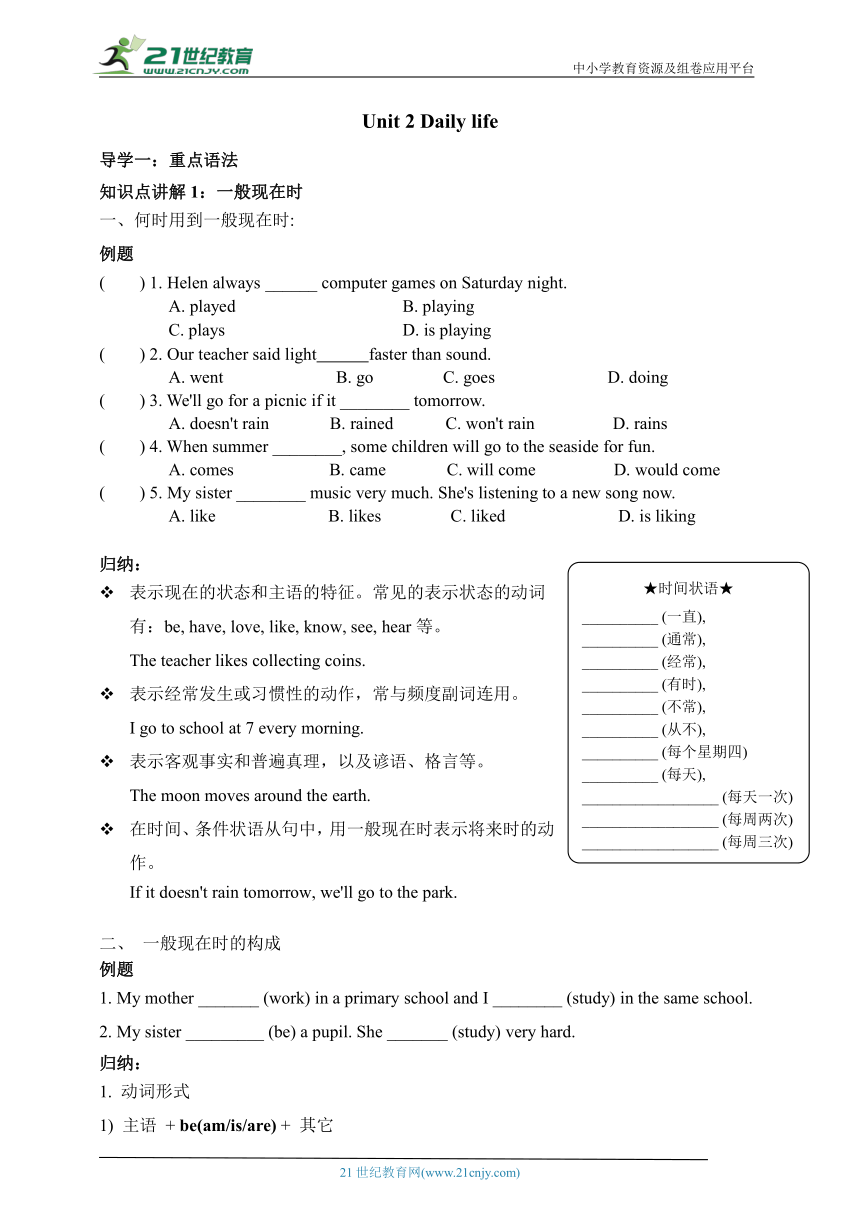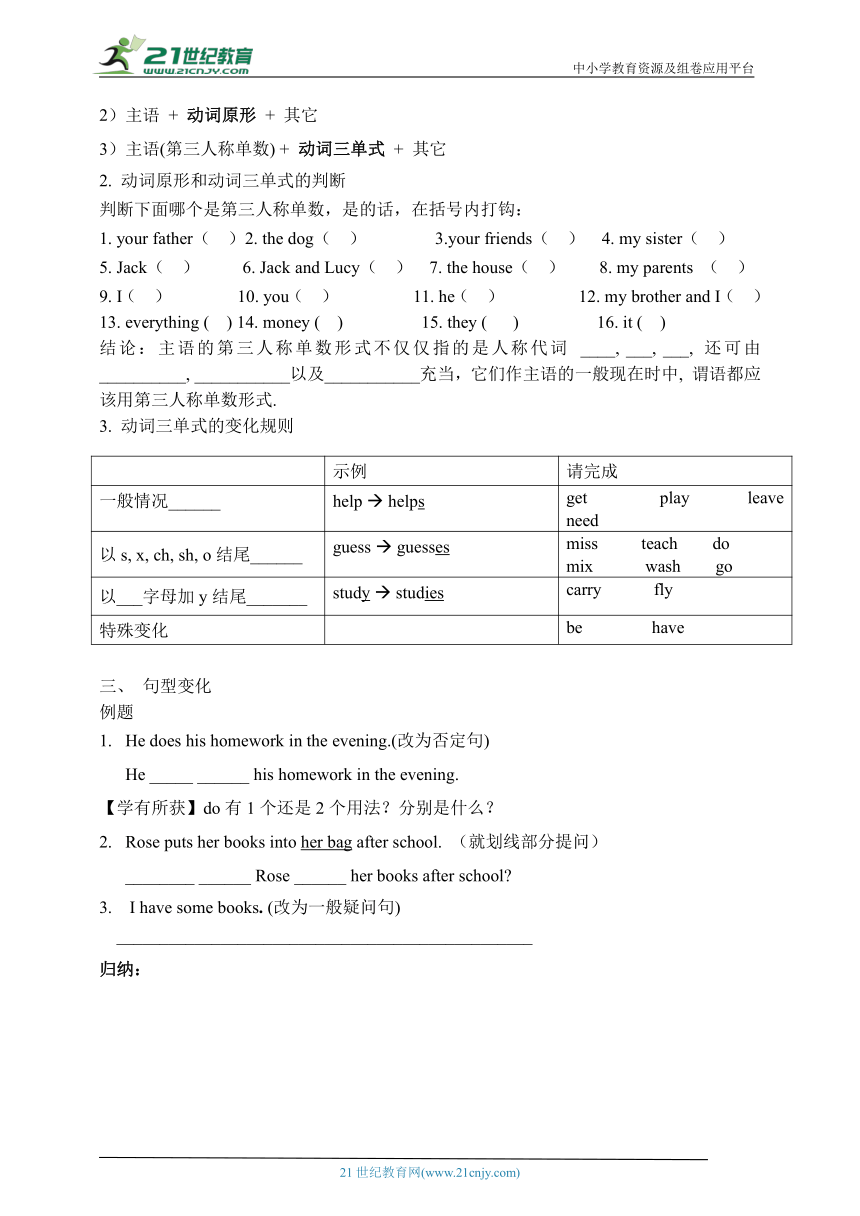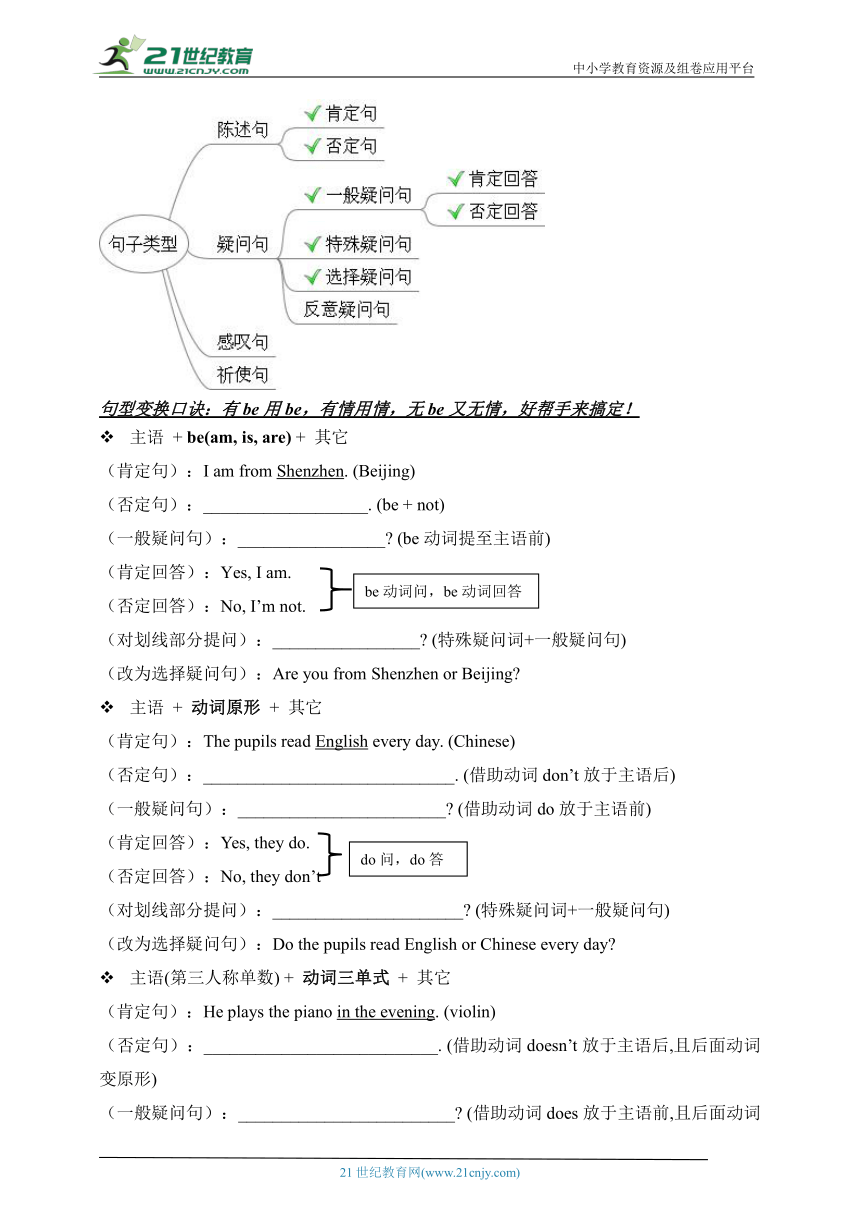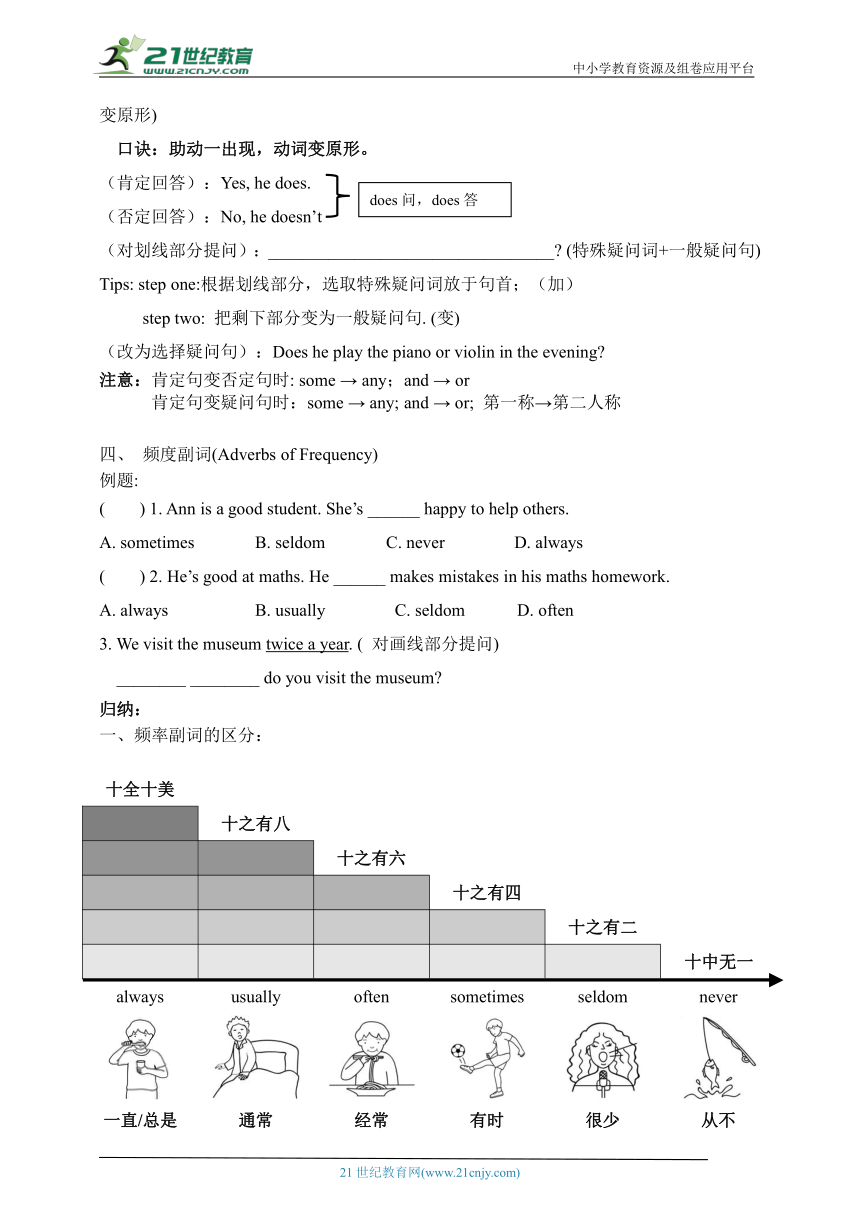Unit 2 Daily life 第四讲 导学一+二 重点语法(含答案)
文档属性
| 名称 | Unit 2 Daily life 第四讲 导学一+二 重点语法(含答案) |

|
|
| 格式 | doc | ||
| 文件大小 | 1.1MB | ||
| 资源类型 | 试卷 | ||
| 版本资源 | 牛津深圳版 | ||
| 科目 | 英语 | ||
| 更新时间 | 2022-09-24 09:04:00 | ||
图片预览




文档简介
中小学教育资源及组卷应用平台
Unit 2 Daily life
导学一:重点语法
知识点讲解1:一般现在时
一、何时用到一般现在时:
例题
( ) 1. Helen always ______ computer games on Saturday night.
A. played B. playing
C. plays D. is playing
( ) 2. Our teacher said light faster than sound.
A. went B. go C. goes D. doing
( ) 3. We'll go for a picnic if it ________ tomorrow.
A. doesn't rain B. rained C. won't rain D. rains
( ) 4. When summer ________, some children will go to the seaside for fun.
A. comes B. came C. will come D. would come
( ) 5. My sister ________ music very much. She's listening to a new song now.
A. like B. likes C. liked D. is liking
归纳:
表示现在的状态和主语的特征。常见的表示状态的动词有:be, have, love, like, know, see, hear等。
The teacher likes collecting coins.
表示经常发生或习惯性的动作,常与频度副词连用。
I go to school at 7 every morning.
表示客观事实和普遍真理,以及谚语、格言等。
The moon moves around the earth.
在时间、条件状语从句中,用一般现在时表示将来时的动作。
If it doesn't rain tomorrow, we'll go to the park.
二、 一般现在时的构成
例题
1. My mother _______ (work) in a primary school and I ________ (study) in the same school.
2. My sister _________ (be) a pupil. She _______ (study) very hard.
归纳:
1. 动词形式
1) 主语 + be(am/is/are) + 其它
2)主语 + 动词原形 + 其它
3)主语(第三人称单数) + 动词三单式 + 其它
2. 动词原形和动词三单式的判断
判断下面哪个是第三人称单数,是的话,在括号内打钩:
1. your father( )2. the dog( ) 3.your friends( ) 4. my sister( )
5. Jack( ) 6. Jack and Lucy( ) 7. the house( ) 8. my parents ( )
9. I( ) 10. you( ) 11. he( ) 12. my brother and I( )
13. everything ( ) 14. money ( ) 15. they ( ) 16. it ( )
结论:主语的第三人称单数形式不仅仅指的是人称代词 ____, ___, ___, 还可由__________, ___________以及___________充当,它们作主语的一般现在时中, 谓语都应该用第三人称单数形式.
3. 动词三单式的变化规则
示例 请完成
一般情况______ help helps get play leave need
以s, x, ch, sh, o结尾______ guess guesses miss teach domix wash go
以___字母加y结尾_______ study studies carry fly
特殊变化 be have
三、 句型变化
例题
He does his homework in the evening.(改为否定句)
He _____ ______ his homework in the evening.
【学有所获】do有1个还是2个用法?分别是什么?
Rose puts her books into her bag after school. (就划线部分提问)
________ ______ Rose ______ her books after school
3. I have some books. (改为一般疑问句)
________________________________________________
归纳:
句型变换口诀:有be用be,有情用情,无be又无情,好帮手来搞定!
主语 + be(am, is, are) + 其它
(肯定句):I am from Shenzhen. (Beijing)
(否定句):___________________. (be + not)
(一般疑问句):_________________ (be动词提至主语前)
(肯定回答):Yes, I am.
(否定回答):No, I’m not.
(对划线部分提问):_________________ (特殊疑问词+一般疑问句)
(改为选择疑问句):Are you from Shenzhen or Beijing
主语 + 动词原形 + 其它
(肯定句):The pupils read English every day. (Chinese)
(否定句):_____________________________. (借助动词don’t放于主语后)
(一般疑问句):________________________ (借助动词do放于主语前)
(肯定回答):Yes, they do.
(否定回答):No, they don’t
(对划线部分提问):______________________ (特殊疑问词+一般疑问句)
(改为选择疑问句):Do the pupils read English or Chinese every day
主语(第三人称单数) + 动词三单式 + 其它
(肯定句):He plays the piano in the evening. (violin)
(否定句):___________________________. (借助动词doesn’t放于主语后,且后面动词变原形)
(一般疑问句):_________________________ (借助动词does放于主语前,且后面动词变原形)
口诀:助动一出现,动词变原形。
(肯定回答):Yes, he does.
(否定回答):No, he doesn’t
(对划线部分提问):_________________________________ (特殊疑问词+一般疑问句)
Tips: step one:根据划线部分,选取特殊疑问词放于句首;(加)
step two: 把剩下部分变为一般疑问句. (变)
(改为选择疑问句):Does he play the piano or violin in the evening
注意:肯定句变否定句时: some → any;and → or
肯定句变疑问句时:some → any; and → or; 第一称→第二人称
四、 频度副词(Adverbs of Frequency)
例题:
( ) 1. Ann is a good student. She’s ______ happy to help others.
A. sometimes B. seldom C. never D. always
( ) 2. He’s good at maths. He ______ makes mistakes in his maths homework.
A. always B. usually C. seldom D. often
3. We visit the museum twice a year. ( 对画线部分提问)
________ ________ do you visit the museum
归纳:
一、频率副词的区分:
十全十美
十之有八
十之有六
十之有四
十之有二
十中无一
always usually often sometimes seldom never
一直/总是 通常 经常 有时 很少 从不
我爱展示:按照以上图片写出句子
1._____________________________________________________________________
2._____________________________________________________________________
3._____________________________________________________________________
4._____________________________________________________________________
5._____________________________________________________________________
6._____________________________________________________________________
发现并总结:频度副词在句中的位置:____________________________
二、针对频率副词/频率次数的短语的提问,选用特殊疑问词:how often。
例题:
1. My parents visit my grandfather twice a month.(就划线部分提问)
__________________________________________
我爱展示
一、单选。
( ) 1. On Monday mornings it usually________ me an hours to drive to work.
A. takes B. is taking C. took D. will take
( ) 2. --- Please give this note to John.
--- OK, I'll give it to him as soon as he _________.
A. is coming back B. will come back C. comes back D. came back
( ) 3. — Both Li Lei and Han Meimei ________ fond of the TV program A Bite of China.
— I am also deeply moved by its stories!
A. is B. am C. was D. are
( ) 4. If Bob ______ away from the junk food, he will be in good health. (2012贵州贵阳中考)
A. stay B. will stay C. stays
( ) 5. -What’s his brother
-He is a teacher. He ______ maths at a school.
A. taught B. has taught C. teaches D. will teach
( )6. There _____ some flowers on the teacher’s desk just now, but now there _____nothing on it.
A. have; has B. were; was C. were; is D. has; has
( ) 7. Betty will ring me up when she _______ in Beijing.
A. arrive B. arrives C. arrived D. will arrive
( ) 8. Now my father _____ his bike to work every day instead of driving.
A. ride B. rode C. rides D. will ride
( ) 9. --- He came early this morning, didn't he
---Yes, he did. He often _______ to school early.
A. come B. comes C. came D. has come
( ) 10. --- How often does Miss Li make phone ________ to her students
--- ________.
A. calls; Some time B. calls; Sometimes
C. call; Some time D. call; Sometimes
( ) 11. Summer holiday is coming, Li Lei with his father to go to Shanghai.
A. want B. will want C. wants
( ) 12. — How often do the students play sports — .
A. Twice a day B. Since last day
C. For two hours D. A month ago
( ) 13. We usually have six lessons a day, and each of them ________ 45minutes.
A. last B. lasts C. have D. need
二、完成句子。
1. They swim in this swimming pool in summer.(改为否定句)
___________________________________________
2. It takes me three hours to get to that park.(对划线部分提问)
_________________________________________________
3. They take a bus to school every day.(改为一般疑问句)
___________________________________________
4. Ann goes to violin lessons on Friday.(就划线部分提问)
__________________________________________
导学二:感叹句
例句:How short it is! 多么短呀!
这是感叹句,感叹句是表达喜、怒、哀、乐以及惊奇、惊讶等强烈感情的句子。感叹句通常由 what 或 how 引导。现分述如下:
一、由 what 引导的感叹句,其句子结构可分为以下三种:
(1)可用句型:“ What + a/an +形容词+可数名词单数+主语+谓语!”。如:
______ ______nice present it is! 它是一件多么好的礼物啊!
______ ______ interesting book it is! 它是一本多么有趣的书啊!
(2)可用句型:“ What +形容词+可数名词复数+主语+谓语!”。如:
______ ______ ______ they are! 多么漂亮的花啊!
______ ______ ______ they are! 他们是多么好的孩子啊!
(3)可用句型:“ What +形容词+不可数名词+主语+谓语!”。如:
______ ______ weather it is today! 今天天气多好啊!
______ ______ news it is! 多重要的新闻啊!
二、由 how 引导的感叹句,其句子结构也分为三种:
(1)可用句型:“ How +形容词 / 副词+主语+谓语!”。如:
______ careful she is! 她多么细心啊!
______ fast he runs! 他跑得多快啊!
(2)可用句型:“ How +形容词+ a/an +可数名词单数+主语+谓语!”。如:
______ ______ a girl she is! 她是个多么漂亮的姑娘啊!
(3)可用句型:“ How +主语+谓语!”。如:
How time flies! 光阴似箭!
由 what 引导的感叹句与由 how 引导的感叹句有时可以转换,但句中部分单词的顺序要有所变化。如:
How beautiful a girl she is! = What a beautiful girl she is!
What delicious cakes these are! = How delicious these cakes are!
我爱展示
1. —______ bad weather! We can’t go for a picnic because of the rain today.
—I hope it’ll stop soon.
A. What B. How C. What a D. How a
2.—The six students from Lianyungang got the first prize in the Chinese Characters Dictation Competition in Jiangsu.
—_______ exciting news it is!
A. What B. How C. What an D. How an
3._______ delicious these beef noodles are!
A. What B. How C. What a D. How a
导学一:重点语法
【参考答案】C; C; A; A; B
【参考答案】works;study; is;studies
【参考答案】 1. doesn’t do
【参考答案】 2. Where does put
【参考答案】 3. Do you have any books
【参考答案】
1-2 DC
3. How often
【参考答案】How often do your parents visit your grandfather
我爱展示
1-5 ACDCC 6-10 CBCBB 11-12 CAB
二、【参考答案】They don’t swim in this swimming pool in summer.
【参考答案】How long does it take you to get to that park
【参考答案】Do they take a bus to school every day
【参考答案】When does Ann go to violin lessons
导学二:感叹句
我爱展示
A A B
★时间状语★
__________ (一直),
__________ (通常),
__________ (经常),
__________ (有时),
__________ (不常),
__________ (从不),
__________ (每个星期四)
__________ (每天),
__________________ (每天一次)
__________________ (每周两次)
__________________ (每周三次)
be动词问,be动词回答
do问,do答
does问,does答
21世纪教育网 www.21cnjy.com 精品试卷·第 2 页 (共 2 页)
HYPERLINK "http://21世纪教育网(www.21cnjy.com)
" 21世纪教育网(www.21cnjy.com)
Unit 2 Daily life
导学一:重点语法
知识点讲解1:一般现在时
一、何时用到一般现在时:
例题
( ) 1. Helen always ______ computer games on Saturday night.
A. played B. playing
C. plays D. is playing
( ) 2. Our teacher said light faster than sound.
A. went B. go C. goes D. doing
( ) 3. We'll go for a picnic if it ________ tomorrow.
A. doesn't rain B. rained C. won't rain D. rains
( ) 4. When summer ________, some children will go to the seaside for fun.
A. comes B. came C. will come D. would come
( ) 5. My sister ________ music very much. She's listening to a new song now.
A. like B. likes C. liked D. is liking
归纳:
表示现在的状态和主语的特征。常见的表示状态的动词有:be, have, love, like, know, see, hear等。
The teacher likes collecting coins.
表示经常发生或习惯性的动作,常与频度副词连用。
I go to school at 7 every morning.
表示客观事实和普遍真理,以及谚语、格言等。
The moon moves around the earth.
在时间、条件状语从句中,用一般现在时表示将来时的动作。
If it doesn't rain tomorrow, we'll go to the park.
二、 一般现在时的构成
例题
1. My mother _______ (work) in a primary school and I ________ (study) in the same school.
2. My sister _________ (be) a pupil. She _______ (study) very hard.
归纳:
1. 动词形式
1) 主语 + be(am/is/are) + 其它
2)主语 + 动词原形 + 其它
3)主语(第三人称单数) + 动词三单式 + 其它
2. 动词原形和动词三单式的判断
判断下面哪个是第三人称单数,是的话,在括号内打钩:
1. your father( )2. the dog( ) 3.your friends( ) 4. my sister( )
5. Jack( ) 6. Jack and Lucy( ) 7. the house( ) 8. my parents ( )
9. I( ) 10. you( ) 11. he( ) 12. my brother and I( )
13. everything ( ) 14. money ( ) 15. they ( ) 16. it ( )
结论:主语的第三人称单数形式不仅仅指的是人称代词 ____, ___, ___, 还可由__________, ___________以及___________充当,它们作主语的一般现在时中, 谓语都应该用第三人称单数形式.
3. 动词三单式的变化规则
示例 请完成
一般情况______ help helps get play leave need
以s, x, ch, sh, o结尾______ guess guesses miss teach domix wash go
以___字母加y结尾_______ study studies carry fly
特殊变化 be have
三、 句型变化
例题
He does his homework in the evening.(改为否定句)
He _____ ______ his homework in the evening.
【学有所获】do有1个还是2个用法?分别是什么?
Rose puts her books into her bag after school. (就划线部分提问)
________ ______ Rose ______ her books after school
3. I have some books. (改为一般疑问句)
________________________________________________
归纳:
句型变换口诀:有be用be,有情用情,无be又无情,好帮手来搞定!
主语 + be(am, is, are) + 其它
(肯定句):I am from Shenzhen. (Beijing)
(否定句):___________________. (be + not)
(一般疑问句):_________________ (be动词提至主语前)
(肯定回答):Yes, I am.
(否定回答):No, I’m not.
(对划线部分提问):_________________ (特殊疑问词+一般疑问句)
(改为选择疑问句):Are you from Shenzhen or Beijing
主语 + 动词原形 + 其它
(肯定句):The pupils read English every day. (Chinese)
(否定句):_____________________________. (借助动词don’t放于主语后)
(一般疑问句):________________________ (借助动词do放于主语前)
(肯定回答):Yes, they do.
(否定回答):No, they don’t
(对划线部分提问):______________________ (特殊疑问词+一般疑问句)
(改为选择疑问句):Do the pupils read English or Chinese every day
主语(第三人称单数) + 动词三单式 + 其它
(肯定句):He plays the piano in the evening. (violin)
(否定句):___________________________. (借助动词doesn’t放于主语后,且后面动词变原形)
(一般疑问句):_________________________ (借助动词does放于主语前,且后面动词变原形)
口诀:助动一出现,动词变原形。
(肯定回答):Yes, he does.
(否定回答):No, he doesn’t
(对划线部分提问):_________________________________ (特殊疑问词+一般疑问句)
Tips: step one:根据划线部分,选取特殊疑问词放于句首;(加)
step two: 把剩下部分变为一般疑问句. (变)
(改为选择疑问句):Does he play the piano or violin in the evening
注意:肯定句变否定句时: some → any;and → or
肯定句变疑问句时:some → any; and → or; 第一称→第二人称
四、 频度副词(Adverbs of Frequency)
例题:
( ) 1. Ann is a good student. She’s ______ happy to help others.
A. sometimes B. seldom C. never D. always
( ) 2. He’s good at maths. He ______ makes mistakes in his maths homework.
A. always B. usually C. seldom D. often
3. We visit the museum twice a year. ( 对画线部分提问)
________ ________ do you visit the museum
归纳:
一、频率副词的区分:
十全十美
十之有八
十之有六
十之有四
十之有二
十中无一
always usually often sometimes seldom never
一直/总是 通常 经常 有时 很少 从不
我爱展示:按照以上图片写出句子
1._____________________________________________________________________
2._____________________________________________________________________
3._____________________________________________________________________
4._____________________________________________________________________
5._____________________________________________________________________
6._____________________________________________________________________
发现并总结:频度副词在句中的位置:____________________________
二、针对频率副词/频率次数的短语的提问,选用特殊疑问词:how often。
例题:
1. My parents visit my grandfather twice a month.(就划线部分提问)
__________________________________________
我爱展示
一、单选。
( ) 1. On Monday mornings it usually________ me an hours to drive to work.
A. takes B. is taking C. took D. will take
( ) 2. --- Please give this note to John.
--- OK, I'll give it to him as soon as he _________.
A. is coming back B. will come back C. comes back D. came back
( ) 3. — Both Li Lei and Han Meimei ________ fond of the TV program A Bite of China.
— I am also deeply moved by its stories!
A. is B. am C. was D. are
( ) 4. If Bob ______ away from the junk food, he will be in good health. (2012贵州贵阳中考)
A. stay B. will stay C. stays
( ) 5. -What’s his brother
-He is a teacher. He ______ maths at a school.
A. taught B. has taught C. teaches D. will teach
( )6. There _____ some flowers on the teacher’s desk just now, but now there _____nothing on it.
A. have; has B. were; was C. were; is D. has; has
( ) 7. Betty will ring me up when she _______ in Beijing.
A. arrive B. arrives C. arrived D. will arrive
( ) 8. Now my father _____ his bike to work every day instead of driving.
A. ride B. rode C. rides D. will ride
( ) 9. --- He came early this morning, didn't he
---Yes, he did. He often _______ to school early.
A. come B. comes C. came D. has come
( ) 10. --- How often does Miss Li make phone ________ to her students
--- ________.
A. calls; Some time B. calls; Sometimes
C. call; Some time D. call; Sometimes
( ) 11. Summer holiday is coming, Li Lei with his father to go to Shanghai.
A. want B. will want C. wants
( ) 12. — How often do the students play sports — .
A. Twice a day B. Since last day
C. For two hours D. A month ago
( ) 13. We usually have six lessons a day, and each of them ________ 45minutes.
A. last B. lasts C. have D. need
二、完成句子。
1. They swim in this swimming pool in summer.(改为否定句)
___________________________________________
2. It takes me three hours to get to that park.(对划线部分提问)
_________________________________________________
3. They take a bus to school every day.(改为一般疑问句)
___________________________________________
4. Ann goes to violin lessons on Friday.(就划线部分提问)
__________________________________________
导学二:感叹句
例句:How short it is! 多么短呀!
这是感叹句,感叹句是表达喜、怒、哀、乐以及惊奇、惊讶等强烈感情的句子。感叹句通常由 what 或 how 引导。现分述如下:
一、由 what 引导的感叹句,其句子结构可分为以下三种:
(1)可用句型:“ What + a/an +形容词+可数名词单数+主语+谓语!”。如:
______ ______nice present it is! 它是一件多么好的礼物啊!
______ ______ interesting book it is! 它是一本多么有趣的书啊!
(2)可用句型:“ What +形容词+可数名词复数+主语+谓语!”。如:
______ ______ ______ they are! 多么漂亮的花啊!
______ ______ ______ they are! 他们是多么好的孩子啊!
(3)可用句型:“ What +形容词+不可数名词+主语+谓语!”。如:
______ ______ weather it is today! 今天天气多好啊!
______ ______ news it is! 多重要的新闻啊!
二、由 how 引导的感叹句,其句子结构也分为三种:
(1)可用句型:“ How +形容词 / 副词+主语+谓语!”。如:
______ careful she is! 她多么细心啊!
______ fast he runs! 他跑得多快啊!
(2)可用句型:“ How +形容词+ a/an +可数名词单数+主语+谓语!”。如:
______ ______ a girl she is! 她是个多么漂亮的姑娘啊!
(3)可用句型:“ How +主语+谓语!”。如:
How time flies! 光阴似箭!
由 what 引导的感叹句与由 how 引导的感叹句有时可以转换,但句中部分单词的顺序要有所变化。如:
How beautiful a girl she is! = What a beautiful girl she is!
What delicious cakes these are! = How delicious these cakes are!
我爱展示
1. —______ bad weather! We can’t go for a picnic because of the rain today.
—I hope it’ll stop soon.
A. What B. How C. What a D. How a
2.—The six students from Lianyungang got the first prize in the Chinese Characters Dictation Competition in Jiangsu.
—_______ exciting news it is!
A. What B. How C. What an D. How an
3._______ delicious these beef noodles are!
A. What B. How C. What a D. How a
导学一:重点语法
【参考答案】C; C; A; A; B
【参考答案】works;study; is;studies
【参考答案】 1. doesn’t do
【参考答案】 2. Where does put
【参考答案】 3. Do you have any books
【参考答案】
1-2 DC
3. How often
【参考答案】How often do your parents visit your grandfather
我爱展示
1-5 ACDCC 6-10 CBCBB 11-12 CAB
二、【参考答案】They don’t swim in this swimming pool in summer.
【参考答案】How long does it take you to get to that park
【参考答案】Do they take a bus to school every day
【参考答案】When does Ann go to violin lessons
导学二:感叹句
我爱展示
A A B
★时间状语★
__________ (一直),
__________ (通常),
__________ (经常),
__________ (有时),
__________ (不常),
__________ (从不),
__________ (每个星期四)
__________ (每天),
__________________ (每天一次)
__________________ (每周两次)
__________________ (每周三次)
be动词问,be动词回答
do问,do答
does问,does答
21世纪教育网 www.21cnjy.com 精品试卷·第 2 页 (共 2 页)
HYPERLINK "http://21世纪教育网(www.21cnjy.com)
" 21世纪教育网(www.21cnjy.com)
